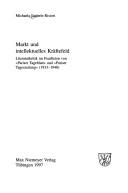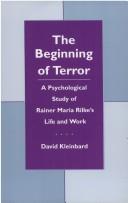| Listing 1 - 6 of 6 |
Sort by
|
Book
ISBN: 1469658615 1469658607 Year: 1965 Publisher: Chapel Hill : University of North Carolina Press,
Abstract | Keywords | Export | Availability | Bookmark
 Loading...
Loading...Choose an application
- Reference Manager
- EndNote
- RefWorks (Direct export to RefWorks)
Book
ISBN: 1469657902 0807881570 Year: 1967 Publisher: Chapel Hill, University of North Carolina Press
Abstract | Keywords | Export | Availability | Bookmark
 Loading...
Loading...Choose an application
- Reference Manager
- EndNote
- RefWorks (Direct export to RefWorks)
Romanticism --- Authors, German --- Tieck, Ludwig, --- Friends and associates.
Book
ISBN: 9781909254978 9781909254985 1909254975 1909254983 9781909254961 9781909254954 9781909254992 1909254991 1909254967 2821881703 Year: 2016 Publisher: Open Book Publishers
Abstract | Keywords | Export | Availability | Bookmark
 Loading...
Loading...Choose an application
- Reference Manager
- EndNote
- RefWorks (Direct export to RefWorks)
"This is the first full-scale biography, in any language, of a towering figure in German and European Romanticism: August Wilhelm Schlegel whose life, 1767 to 1845, coincided with its inexorable rise. As poet, translator, critic and oriental scholar, Schlegel's extraordinarily diverse interests and writings left a vast intellectual legacy, making him a foundational figure in several branches of knowledge. He was one of the last thinkers in Europe able to practise as well as to theorise, and to attempt to comprehend the nature of culture without being forced to be a narrow specialist. With his brother Friedrich, for example, Schlegel edited the avant-garde Romantic periodical Athenaeum; and he produced with his wife Caroline a translation of Shakespeare, the first metrical version into any foreign language. Schlegel's Lectures on Dramatic Art and Literature were a defining force for Coleridge and for the French Romantics. But his interests extended to French, Italian, Spanish and Portuguese literature, as well to the Greek and Latin classics, and to Sanskrit. August Wilhelm Schlegel is the first attempt to engage with this totality, to combine an account of Schlegel’s life and times with a critical evaluation of his work and its influence. Through the study of one man's rich life, incorporating the most recent scholarship, theoretical approaches, and archival resources, while remaining easily accessible to all readers, Paulin has recovered the intellectual climate of Romanticism in Germany and traced its development into a still-potent international movement. The extraordinarily wide scope and variety of Schlegel's activities have hitherto acted as a barrier to literary scholars, even in Germany. In Roger Paulin, whose career has given him the knowledge and the experience to grapple with such an ambitious project, Schlegel has at last found a worthy exponent. "
Authors, German --- Romanticism --- German literature --- History and criticism. --- Schlegel, August Wilhelm von, --- Young Germany --- A. W. S. --- S., A. W. --- literature --- biography --- history

ISBN: 3484350571 3110937344 9783484350571 Year: 1997 Volume: 57 Publisher: Tübingen: Niemeyer,
Abstract | Keywords | Export | Availability | Bookmark
 Loading...
Loading...Choose an application
- Reference Manager
- EndNote
- RefWorks (Direct export to RefWorks)
Während seines Erscheinungszeitraums (1933-1940) war das "Pariser Tageblatt" und sein Nachfolgeorgan "Pariser Tageszeitung" die einzige Tageszeitung des deutschen Exils. Diese pressegeschichtliche Sonderstellung akzentuierte seine herausragende Rolle als Repräsentant - und Aktant - in der politisch-kulturellen Öffentlichkeit des Exils und eröffnet heute neue Forschungsfelder, u.a. vor dem Hintergrund publizistischer Traditionen und Sparten wie dem Feuilleton. Ausgehend von der Frage nach den vielfältigen Formen redaktioneller, ökonomischer und ästhetischer Vermitteltheit literaturkritischer Praxis verbindet die durch Archivquellen abgestützte Untersuchung kommunikationsgeschichtliche, literatursoziologische und literaturwissenschaftliche Ansätze. So entwickelt sie einen mehrschichtigen Begriff von Literaturkritik, der diese als publizistische Institution im kulturellen Kräftefeld der deutschen Emigration in Frankreich, als ökonomischen Faktor auf dem literarischen Markt und als ästhetischen Diskurs innerhalb der literarischen Öffentlichkeit beschreibbar macht. Auf diese Weise gewinnt die Untersuchung exemplarischen Charakter für die Analyse literarischer Kommunikation während des Exils. Neben dem Beitrag von "Pariser Tageblatt" bzw. "Pariser Tageszeitung" zur Entwicklung literarästhetischer Positionen innerhalb des intellektuellen Kräftefeldes dieser Jahre, der die Zeitung u.a. in diskursive Auseinandersetzung mit "Das Wort" treten ließ, gilt ein besonderes Augenmerk der Rezeption und Kommentierung französischer Literatur. Der selektive Charakter des Literaturtransfers weist auf seinen außerästhetischen Anlaß zurück und unterstreicht gerade damit das Grundproblem einer Literaturkritik des Exils, die sich - bis auf Ausnahmen; im vorliegenden Falle u.a. Alfred Döblin, Alfred Wolkenstein und Ferdinand Hardekopf - der konjunkturellen Ausdifferenzierung einer exilspezifischen Ästhetik widmete und dabei längerfristige Entwicklungen der Moderne weitgehend ausblendete. Ein Verzeichnis sämtlicher Rezensionen mit Registern ist der Untersuchung beigefügt.
German literature --- European literature --- Authors, German --- Authors, Exiled --- Criticism --- History and criticism. --- Homes and haunts --- History --- Feuilleton. --- Literaturkritik. --- Pariser Tageszeitung. --- LANGUAGE ARTS & DISCIPLINES / General. --- Paris (France) --- Intellectual life --- Pariser Tageblatt --- German literature - 20th century - History and criticism. --- European literature - 20th century - History and criticism. --- Authors, German - Homes and haunts - France. --- Authors, Exiled - Homes and haunts - France. --- Criticism - History - 20th century.

ISBN: 0814763588 0814746268 0814746675 9780814763582 9780814746677 9780814746264 Year: 1993 Publisher: New York, NY : New York University Press,
Abstract | Keywords | Export | Availability | Bookmark
 Loading...
Loading...Choose an application
- Reference Manager
- EndNote
- RefWorks (Direct export to RefWorks)
The insights here are of such depth, and contain such beauty in them, that time and again the reader must pause for breath. At last Rilke has met a critic whose insight, courage, and humanity are worthy of his life and work."—Leslie Epstein Director, Graduate Creative Writing Program, Boston University "[A] well-reasoned, fairly fascinating, and illuminating study which soundly and convincingly applies Freudian and particularly post-Freudian insights into the self, to Rilke's life and work, in a way which enlightens us considerably as to the relationship between life and work in original ways. Kleinbard takes off where Hugo Simenauer's monumental psycho- biography of Rilke (1953) left off. . . . He succeeds in giving us a psychic portrait of the poet which is more illuminating and which . . . does greater justice to its subject than any of his predecessors.. . . . Any reader with strong interest in Rilke would certainly welcome the availability of this study."—Walter H. Sokel,Commonwealth Professor of German and English Literatures,University of Virginia. For beauty is nothing but the beginning of terror, which we are just able to bear, and we wonder at it so because it calmly disdainsto destroy us."—Rilke Beginning with Rilke's 1910 novel, The Notebooks of Malte Laurids Brigge, The Beginning of Terror examines the ways in which the poet mastered the illness that is so frightening and crippling in Malte and made the illness a resource for his art. Kleinbard goes on to explore Rilke's poetry, letters, and non-fiction prose, his childhood and marriage, and the relationship between illness and genius in the poet and his work, a subject to which Rilke returned time and again. This psychoanalytic study also defines the complex connections between Malte's and Rilke's fantasies of mental and physical fragmentation, and the poet's response to Rodin's disintegrative and re-integrative sculpture during the writing of The Notebooks and New Poems. One point of departure is the poet's sense of the origins of his illness in his childhood and, particularly, in his mother's blind, narcissistic self- absorption and his father's emotional constriction and mental limitations. Kleinbard examines the poet's struggle to purge himself of his deeply felt identification with his mother, even as he fulfilled her hopes that he become a major poet. The book also contains chapters on Rilke's relationships with Lou Andreas Salom and Aguste Rodin, who served as parental surrogates for Rilke. A psychological portrait of the early twentieth-century German poet, The Beginning of Terror explores Rilke's poetry, letters, non-fiction prose, his childhood and marriage. David Kleinbard focuses on the relationship between illness and genius in the poet and his work, a subject to which Rilke returned time and again.
Authors, German -- 20th century -- Biography. --- Authors, German -- 20th century. --- Rilke, Rainer Maria, 1875-1926 -- Psychology. --- Authors, German --- Languages & Literatures --- Germanic Literature --- Biography --- Rilke, Rainer Maria, --- Psychology. --- 830 "19" RILKE, RAINER MARIA --- 830 "19" RILKE, RAINER MARIA Duitse literatuur--20e eeuw. Periode 1900-1999--RILKE, RAINER MARIA --- Duitse literatuur--20e eeuw. Periode 1900-1999--RILKE, RAINER MARIA --- Rilke, René Maria Cäsar, --- Li-erh-kʻo, --- Rielke, Rainer Maria, --- Rilkʻe, Rainŏ Maria, --- Rilḳeh, Rainer Mariyah, --- Rilke, Reiner Marie, --- רילקה, ראינר מריה, --- רילקה, ריינר מריה --- רילקה, ריינר מריה, --- רילקה, רינר מריה --- רילקה, רינר מריה, --- רילקה, רץ מ. --- רילקה, ר.מ --- Biography. --- リルケ, ライナー マリア --- Rilke, Rainer Maria
Book
ISBN: 1501745018 150174500X 9781501745003 9781501745010 9781501744990 1501744992 1501761706 Year: 2019 Publisher: Cornell University Press
Abstract | Keywords | Export | Availability | Bookmark
 Loading...
Loading...Choose an application
- Reference Manager
- EndNote
- RefWorks (Direct export to RefWorks)
"During the period of his American exile in the 1930s and 1940s, the German author Thomas Mann became one of the most prominent anti-fascists in the United States, and in so doing forever transformed our understanding of what a modern writer is and should be doing"--
Authors, German --- Authors, Exiled --- Politics and literature --- World War, 1939-1945 --- World War, 1939-1945, in literature --- Exiled authors --- Exiles --- Refugees --- Expatriate authors --- Political and social views. --- Political activity --- History --- Literature and the war. --- Public opinion. --- Foreign public opinion --- Mann, Thomas, --- Mann, Paul Thomas --- Mann, Thomas --- マン・トオマス --- マン, トーマス --- Political activity. --- World War II, world literature, exile, propaganda, Doctor Faustus.
| Listing 1 - 6 of 6 |
Sort by
|

 Search
Search Feedback
Feedback About UniCat
About UniCat  Help
Help News
News